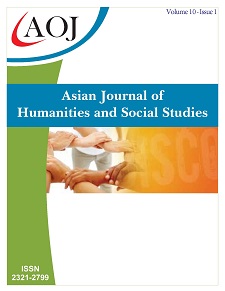Training Culturally Congruent Health Coaches to be Socially-Embedded Support on Physical Activity among Older Asian Americans: Phase One Report
DOI:
https://doi.org/10.24203/ajhss.v10i1.6885Keywords:
health coaches, socially-embedded social support, older Asian Americans, physical activityAbstract
There is a reported heterogeneity in burden with cardiovascular disease (CVD) among Asian Americans subgroups. Physical inactivity is an identified key risk factor for CVD, across age and race/ethnic backgrounds. The latest data showed that 42% of Asian Americans are physically inactive. Health coaching is a rapidly emerging primary or supplemental intervention to address issues related to preventable chronic illness, including physical inactivity. Hence, the purpose of this paper is to describe Phase One of this project - training of culturally congruent Health Coaches as socially embedded social support to promote physical activity to their older Asian communities. A 3-day training curriculum was developed based on the four pillars of Health Coaching and the Transtheoretical Model of Change. Fifteen Asian Americans Health Coaches were trained using this curriculum. Fifteen health coaches completed the 3-day training. Phase Two of this project is ongoing and results may provide information on the long-term effects of health coaching among older Asian Americans.
References
Heron M. “Deaths: leading causes for 2016.” National Vital Statistics Report. Vol. 67, no. 6, pp. 1–77, 2018. https://www.cdc.gov/nchs/data/nvsr/nvsr67/nvsr67_06.pdf
Center for Disease Control and Prevention. “Lack of Physical activity”. 2020 https://www.cdc.gov/chronicdisease/resources/publications/factsheets/physical-activity.htm
U. S. Department of Health and Human Services Office of Minority Health. “Obesity and Asian Americans” 2020. https://minorityhealth.hhs.gov/omh/browse.aspx?lvl=4&lvlid=55
Domingo, JLB., Gavero, G, & Braun, KL. “Strategies to increase Filipino American participation in CV health promotion: A systematic review. Preventing Chronic Disease vol. 15, pp. 170294, 2018. https://doi.org/10.5888/pcd15.170294
Lawson K. “The four pillars of health coaching: Preserving the heart of a movement.” Global Advances in Health and Medicine, vol. 2 no. 3, pp. 6-8, 2013. https://doi.org/10.7453/gahmj.2013.038
Prochaska JO & DiClemente CC. “Stages and processes of self-change of smoking: Toward an integrative model of change.” Journal of Consulting and Clinical Psychology, vol. 51, no. 3, pp. 390-395 1983. http://ezproxy.emich.edu/login?url=https://www.proquest.com/scholarly-journals/stages-processes-self-change-smoking-toward/docview/614330641/se-2?accountid=10650
Ching-Ling L, Li-Chi H, Yao-Tsung C, Ruey-Yu C, Yang S. “Effectiveness of health coaching in diabetes control and lifestyle improvement: A randomized-controlled trial.” Nutrients, vol. 13, no. 11, pp. 3878, 2021. http://ezproxy.emich.edu/login?url= https:// www. proquest.com/scholarly-journals/effectiveness-health-coaching-diabetescontrol/docview/ 2602147216/se-2
Wolever RQ, Simmons LA, Sforzo GA, et al. “A Systematic Review of the Literature on Health and Wellness Coaching: Defining a Key Behavioral intervention in Healthcare.” Global Advances in Health and Medicine, vol. 2, no. 4, pp. 38-57, 2013. https://doi.org/10.7453/gahmj.2013.042
Cueto V, Wang CJ, & Lee MS. “Impact of a mobile App–Based health coaching and behavior change program on participant engagement and weight status of overweight and obese children: Retrospective cohort study.” JMIR mHealth and uHealth, vol. 7, no. 11), 2019. http://ezproxy.emich.edu/login?url=https://www.proquest.com/scholarly-journals/impact-mobile-app-based-health-coaching-behavior/docview/2511255960/se-2
Downloads
Published
Issue
Section
License
Copyright (c) 2022 Meriam Caboral-Stevens, Dr. Tsu-Yin Wu

This work is licensed under a Creative Commons Attribution-NonCommercial 4.0 International License.
- Papers must be submitted on the understanding that they have not been published elsewhere (except in the form of an abstract or as part of a published lecture, review, or thesis) and are not currently under consideration by another journal published by any other publisher.
- It is also the authors responsibility to ensure that the articles emanating from a particular source are submitted with the necessary approval.
- The authors warrant that the paper is original and that he/she is the author of the paper, except for material that is clearly identified as to its original source, with permission notices from the copyright owners where required.
- The authors ensure that all the references carefully and they are accurate in the text as well as in the list of references (and vice versa).
- Authors retain copyright and grant the journal right of first publication with the work simultaneously licensed under a Attribution-NonCommercial 4.0 International that allows others to share the work with an acknowledgement of the work's authorship and initial publication in this journal.
- Authors are able to enter into separate, additional contractual arrangements for the non-exclusive distribution of the journal's published version of the work (e.g., post it to an institutional repository or publish it in a book), with an acknowledgement of its initial publication in this journal.
- Authors are permitted and encouraged to post their work online (e.g., in institutional repositories or on their website) prior to and during the submission process, as it can lead to productive exchanges, as well as earlier and greater citation of published work (See The Effect of Open Access).
- The journal/publisher is not responsible for subsequent uses of the work. It is the author's responsibility to bring an infringement action if so desired by the author.


